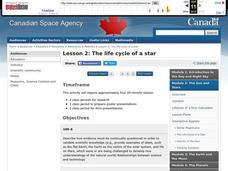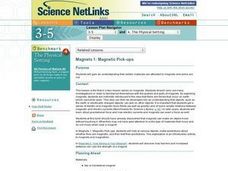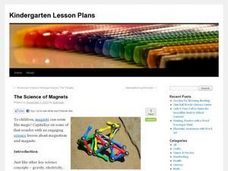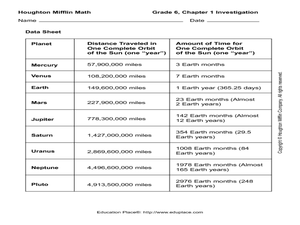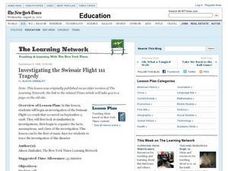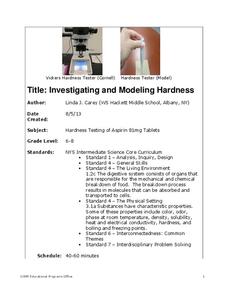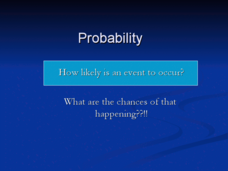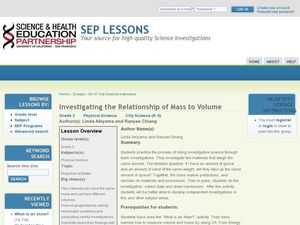Curated OER
The Life Cycle of a Star
Students investigate the life cycle of a star and make conclusions based on evidence, research, and observation. In this lesson on space and scientific investigation, students describe the relationships between science and technology...
Curated OER
Magnetic Pick-ups
Students investigate the push and pull of magnets. In this magnetics lesson, students are introduced to the idea that there are forces that happen on earth which cannot be seen, such as electrically charged objects, magnetic force...
Curated OER
How to Make a Lake
Students examine the Michigan state quarter and discuss the effects glaciers have on land formation. They perform an investigate using ice cubes and sand to show how glaciers have carved the land.
Curated OER
The Science of Magnets
Students are introduced to the concept of magnetism and investigate the properties of magnets. For this magnetism lesson, students identify a magnet then examine why certain things are attracted to magnets and some things are repelled by...
Curated OER
Observing and Questioning
Third graders investigate different types of soil. In this soil lesson, 3rd graders compare various soil samples. They work hands-on with their peers to find the differences and similarities.
Curated OER
Oil Spills
Third graders examine the San Francisco oil spill and the effects it has had. For this investigative lesson students view a demonstration on oil clean up and how it works. They see how wildlife is rehabilitated, how the oil is cleaned...
Curated OER
Grade 6 Math Investigation
In this math investigation worksheet, students find five facts about outer space that contain a number greater then ten million, underlining the digit in the ten millions place. Worksheet has a chart with facts beyond the 10 million place.
National Endowment for the Humanities
“Read All About It”: Primary Source Reading in “Chronicling America”
Can investigative journalism become too sensationalistic and accusatory, or is it vital for the survival of a democracy? Middle schoolers analyze primary source documents from early 20th-century newspapers as well as Theodore Roosevelt's...
Curated OER
Investigating the Swissair Flight 111 Tragedy
Middle schoolers read two articles about the same event: "Plane from J.F.K Crashes off Canada" from the New York Times and "No Survivors from Crash of Swissair Jetliner Off Nova Scotia" from the Associated Press. They then compare the...
Center for Learning in Action
Gases
Explore the properties of gases through one activity and two investigations in which super scientists observe the changes gas makes when encountering different conditions.
Nuffield Foundation
Investigating Factors Affecting the Heart Rate of Daphnia
What variables change heart rate? Young scientists observe the beating heart in Daphnia to understand these variables. They make changes in temperature, chemicals, and other factors as they graph the heart rates. Analysis questions help...
Nuffield Foundation
Investigating the Effect of Temperature on the Activity of Lipase
How does temperature affect lipase activity? Young scholars conduct an experiment to collect data on the interaction of lipase at different temperatures. They add lipase to a solution of milk, sodium carbonate, and phenolphthalein and...
California Academy of Science
Composting: A Scientific Investigation: California Academy of Sciences
Garbage, recycle, compost: Does it really matter where we put our trash once we are done? By making detailed observations over seven weeks, kids will see which materials break down naturally to become a healthy part of the soil, and...
Nuffield Foundation
Investigating How We See Colour
Can you eyes be fooled into seeing colors that aren't actually there? Budding scientists view a presentation that addresses this topic. They explore how their eyes interpret color through the retinas and messages sent to the brain. They...
Nuffield Foundation
Microscale Investigations of Catalase Activity in Plant Extracts
Use indirect measurements to monitor metabolic activity in plant cells. Scholars understand that cells with a higher metabolic rate have a higher concentration of catalase enzyme. They use this information to compare metabolic rates of...
Marine Institute
Water Pollution
Sixth graders investigate the various types of pollutants found in water and ways to help prevent water pollution. Through a hands-on experiment, students create samples of polluted water by mixing water with vegetable oil, dirt, and...
NPR
Investigate the Plastic Problem
Plastics are forever. The second lesson in a 10-part unit has pupils research the effects of plastics on the environment. They present their findings by creating an infographic.
Cornell University
Investigating and Modeling Hardness
Model hardness testing with a self-designed hardness test. Young scholars rate the hardness of different types of aspirin using the Vicker's Hardness scale. They then relate hardness to the solubility of each aspirin tablet.
American Museum of Natural History
Inca Investigation
A fascinating interactive resource lets young archaeologists dig through the history of Huanuco Pampa. The Inca city, located high in the Andes mountains of Peru, was once a thriving community. Craig Morris has spent years researching...
Curated OER
Fiber Identification
Lab sheets for three different crime scene investigation activities are tucked into this resource. In the first activity, inquisitors examine a variety of fibers, including the fiber found at "the crime scene," under ultraviolet light....
Curated OER
Call to Arms: Robotic Analogues for Human Structures
Investigate deep sea discovery through the emerging technology being built. In this physical science instructional activity, young scholars analyze the different types of motion available in the human arm. Students research educational...
Curated OER
Probability Lesson 3
Here are a few well-thought-out discussion questions intended to accompany a probability activity. Learners consider equal chance outcomes under given situations, they investigate those outcomes by tossing a coin 30 times. They analyze...
Curated OER
Up for the Challenge?
A general engineering quiz can be given at the beginning of your engineering or technology unit to stimulate interest. A wide variety of topics are touched by engineers, including the medical industry, energy production, building design,...
Curated OER
Investigating the Relationship of Mass to Volume
Third graders explore the relationship of mass to volume. In this physical science lesson, 3rd graders participate in an investigation with a several materials and measure the mass and volume using scientific tools. Students discuss and...
Other popular searches
- Crime Scene Investigation
- Mathematical Investigations
- Scientific Investigations
- Science Investigations
- Detective Investigation
- Criminal Investigation
- Dead Sea Investigation
- Field Investigations
- Career Investigation
- Crime Investigation
- Hands on Investigations
- Internet Investigation


